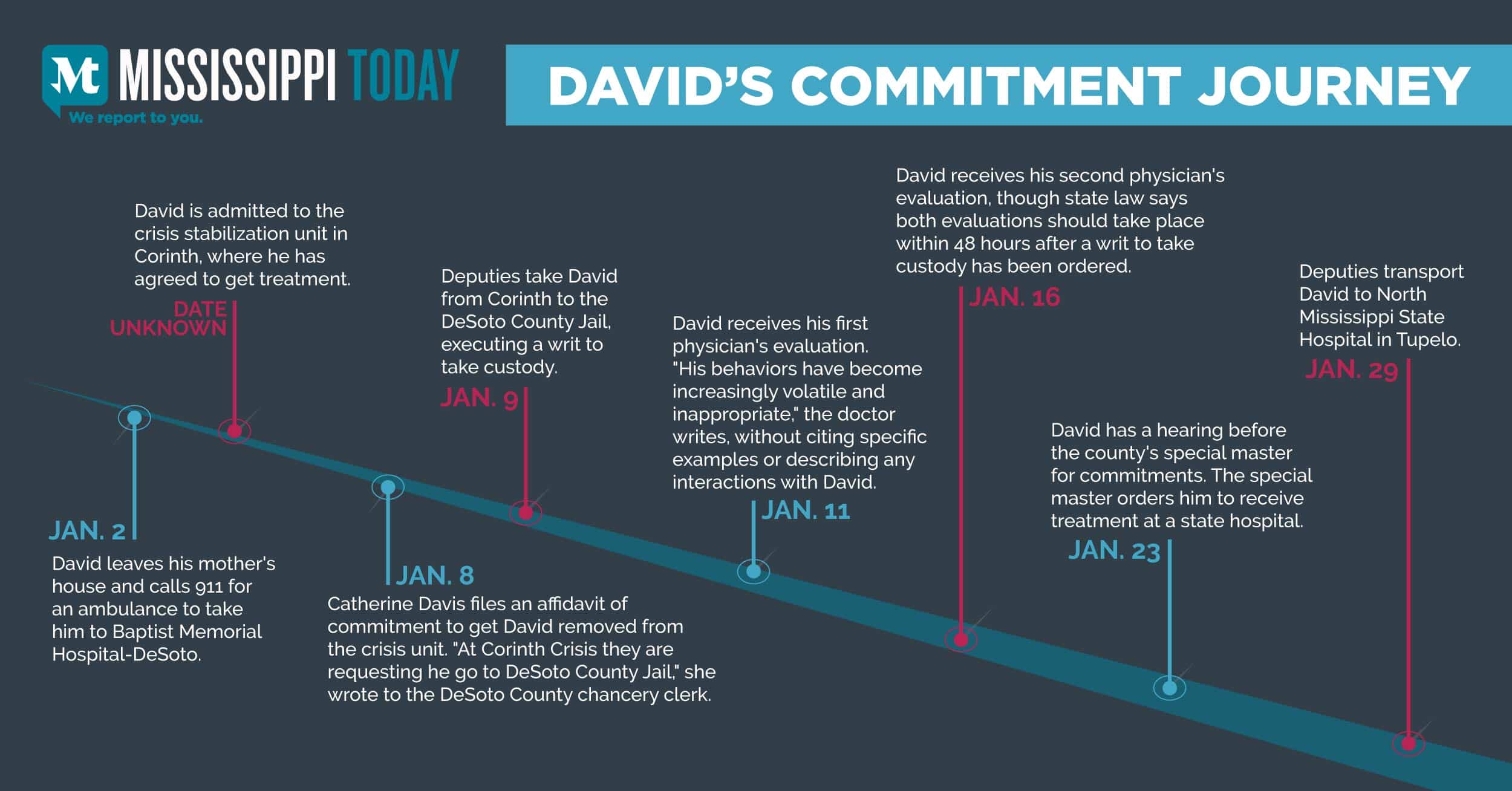Mississippi Today
‘So medieval’: Man with mental illness jailed for 20 days without charges

In January, the head of Mississippi’s Department of Mental Health told lawmakers that people who aren’t charged with a crime are spending less time in jail than they used to: The average wait time for a state hospital bed was down to three days after a court hearing.
At that moment, a young man was on his 16th day locked in the DeSoto County Jail with no criminal charges. He was waiting for mental health treatment.
His mother, Sarah, was still trying to understand why he was there at all.
David, 29, was diagnosed with schizoaffective disorder about a decade ago. Since then, he has cycled through hospital stays and group homes. Sarah can rattle off the low points. There was the time her son was walking in the street and got hit by a car and broke his neck. And the time he called her from a Megabus in Texas, nearly at the border with Mexico.
But this was something new: a three-week detention that began after he called 911 seeking treatment and eventually wound up jailed at the request of his providers.
Her son’s treatment in DeSoto County – where a county website still uses the phrase “lunacy” hearings to refer to the proceedings where judges order people like David to receive psychiatric treatment – reminded Sarah of a different era.
“When they, you know, lock them in the dungeon or whatever and put chains on them and just let them live the rest of their lives there,” she said. “This is so medieval, what they’re doing.”
In the end, David was jailed for a total of three weeks before being transported to North Mississippi State Hospital at the end of January. Mississippi Today is not using his or his family’s real names to protect his privacy.
It is far from unusual in Mississippi and particularly in DeSoto County for people to be jailed solely because they are awaiting treatment through the state’s involuntary commitment process. No other state jails so many people for such lengths of time, solely on the basis of mental illness. Mississippi Today and ProPublica previously reported that hundreds of people are jailed without criminal charges every year while they await evaluations and treatment through the involuntary commitment process.
From 2019 through 2022, DeSoto County jailed people without criminal charges just under 500 times, more than any other county in the news organizations’ analysis.
As lawmakers debate changing Mississippi’s commitment laws to reduce jail detentions, David’s path through the state’s mental health system shows how it can funnel a sick person into jail, and how long it can take for them to get out once locked up.
A publicly funded facility established to treat people in crisis sent David to jail. Though the Department of Mental Health says commitment hearings should take place within 10 days, county officials instead kept him locked up for 14 days before he saw a judge, as winter weather shut down the county court system. The state hospital where the judge ordered him to receive treatment would not admit him for six more days – all of which he spent in jail.
The county is working on opening a crisis center to treat people suffering mental health crises – and keep them out of jail during the commitment process – and supervisors recently voted to hire an architect to draw up renovation plans for the county building that will house the center. The county is currently the largest in the state without one.
County administrator Vanessa Lynchard noted that reforming the commitment process is a priority for the Legislature this year, and that could hopefully bring some relief.
“Nobody likes mental commitments in the jail,” she said.
But officials involved in the process say jail is sometimes the only place they have to detain people during the commitment process, and that jailing people is safer than sending them home. And so every year, the county jails well over 100 people solely because they may be mentally ill – including people like David.
‘He really wants to live a normal life’
In early January, David walked away from his mother’s home in a tidy subdivision in DeSoto County. He knocked on a neighbor’s door and used the phone to call 911 for an ambulance to take him to the hospital.
When Sarah found out he was at Baptist Memorial Hospital-DeSoto, she decided to let him stay there and get treatment. That he had been able to get himself there was a sign of progress. When his mental illness became severe about 10 years ago, “he used to just let himself spin out of control,” Sarah said.
When David was a teenager, he developed phobias that his mother found strange. He stopped wanting to go to school, claiming his breath smelled bad. After he ran away from home, he was hospitalized at Lakeside, a psychiatric hospital in Memphis.
He graduated from high school and got a job working at a warehouse, riding his bicycle more than an hour each way to arrive by 5 or 6 o’clock in the morning.
Then, when he was about 19, “stuff went totally to the left with him,” his mother said. He would disappear from home for days at a time. If he wound up at a hospital, staff wouldn’t tell her he was there, citing patient privacy protections. At home, he would refuse to take medications.
A few years ago, Sarah spent $2,500 to go through the legal process to gain conservatorship over her son so that she would always be included in conversations about his treatment.
“When the dust settles and the smoke clears, he always comes back to me,” she said. “If you’ve got him and put him on the wrong medication and overmedicated him, then I’ve got to help him get back on track.”
David belongs to a tight-knit family: He has siblings, a doting grandfather, aunts and uncles. Sarah’s phone is full of pictures of her son. There’s a shot of him getting his face painted at a family party and another of him wearing a Mickey Mouse t-shirt at Disneyland. A video shows him chasing his sister’s kids around his mother’s backyard.
His family tries to help him manage his symptoms. When he lived with his older sister Beth recently, he would go into the backyard to pace and talk to himself.
“I’d go out there like every 15 minutes, like, ‘Hey, you’re too loud, you need to calm down,’ but I don’t interrupt,” she said. “That’s his way of calming himself down.”
David has told his sister that he doesn’t like depending on her and their mom, that he feels bad he doesn’t drive or hold a job – something that has been a goal for years.
“He’ll tell you that he really wants to live a normal life,” Beth said.
From the crisis unit to a jail cell
One day in January, after a few days at Baptist Memorial Hospital-DeSoto, David was transported to a crisis stabilization unit in Corinth, where he had agreed to get treatment. Operated by the community mental health center Region IV, which serves residents of DeSoto and four other counties, the facility is one of more than a dozen around the state designed to serve people closer to their homes, ideally keeping them out of the state hospitals – and out of jail.
For David, the crisis unit did the opposite.
Sarah sent over her conservatorship paperwork so she could be updated about his treatment. She expected to hear from her son not long after he arrived there, because he always calls her once he feels more like himself. When that didn’t happen, she called the crisis unit.
“He’s in the DeSoto County Jail,” staff told her.
Documents filed with the DeSoto County Chancery Court and reviewed by Mississippi Today show that after refusing medications twice, David had taken them and said he thought it was helping. There were no indications of violence or physical aggression. But not long after he arrived, staff requested a writ – a document allowing the sheriff’s department to take custody of a patient – because of his “agitation and inappropriate sexual conduct.”
Staff reported that he was experiencing “Psychosis including delusions, irritability. He is continually masterbating (sic).” They wrote that he had masturbated in front of other patients and a staff member.
It’s not clear from the documents exactly how long David was at the crisis unit before staff requested the writ, and Sarah said she was not contacted when he arrived there. It may have been as little as a day or two: The court order committing him says he arrived at Corinth “on or about 01/08/24.”
On Jan. 8, Catherine Davis, crisis coordinator at Region IV, which runs the crisis center, wrote: “At Corinth Crisis they are requesting he go to DeSoto County Jail.”
The next afternoon, deputies arrived to take David into custody and drive him 90 minutes back to DeSoto County. He was booked into the county jail with his charge listed as “Writ to take custody.”
Psychiatrists told Mississippi Today that people with David’s condition may exhibit sexually inappropriate behavior like public masturbation, stepping from hypersexuality and impulsivity that can be symptoms of mania.
“All they want to focus on is what he was doing wrong there,” Sarah said. “I understand that. But that’s because he needs psychiatric treatment. He’s mentally unstable. You’re a crisis center. Isn’t that what you do? But instead you ship him off to jail.”
Jason Ramey, executive director of Region IV, the community mental health center that runs the crisis unit, said he can’t discuss a specific client, citing HIPAA.
“At no point in time is it our goal to have somebody sitting in jail, but we also have to think about the wellbeing of the whole CSU, whether it’s the other clients there and things like that,” he said.
Ramey said that in 2023, the crisis unit staff initiated commitment proceedings on only three patients. The facility treated nearly 300 people in the most recent fiscal year.
“We want them to continue to receive treatment,” he said of patients awaiting transfer to a different facility. “If we’re not able to provide that, we want to get them to the state hospital as quickly as possible. It’s not like we file a writ just to have them go sit in jail.”
But in David’s case, that’s exactly what happened.
Dr. Paul Appelbaum, a professor of psychiatry at Columbia and former president of the American Psychiatric Association, reviewed the commitment paperwork and initial evaluation filed with the chancery court in David’s case. He said sending David to jail was wrong.
“The sexually inappropriate behavior is a function of his current acute psychosis, and so the proper response to it is to treat the psychosis, which doesn’t happen overnight,” he said.
Dr. Marvin Swartz, a professor of psychiatry at Duke University, said it may have been appropriate to transfer David to another facility, but that elsewhere in the United States, such a transfer would not involve waiting in jail.
Dr. Lauren Stossel, a forensic psychiatrist and former chief of mental health for New York City jails, said that mental health providers have a responsibility to transfer patients to a higher level of care if they can’t provide safe and effective treatment.
Mississippi’s practice of routinely jailing people without criminal charges while they await psychiatric treatment demands systemic change, she said. But in the meantime, crisis center staff shouldn’t avoid commitment at all costs.
“Clinicians need to consider all their patients and staff and make a decision about what they can manage in their facility,” she said. “The fact that jail is a possible alternative is appalling and needs to be factored in, but they also have to be careful about getting in over their heads trying to manage patients they have no way of treating safely or effectively.”

When reviewing the information crisis center staff provided to the chancery court to justify their decision to initiate commitment proceedings, however, Stossel didn’t see a clear explanation of what staff believed the patient needed that they weren’t equipped to provide.
“It’s not clear to me based on this information: what symptoms or behaviors is this patient exhibiting that you can’t manage? What interventions have you already tried? How long did you allow him to respond to treatment before determining a higher level of care was necessary? It’s crucial to require a clear justification to protect the patient from an unnecessarily restrictive outcome.”
Adam Moore, spokesman for the Department of Mental Health, which funds the crisis units, did not answer specific questions about what happened to David. He said in an email statement that a crisis unit may initiate commitment proceedings when their clinical staff feels that someone served there meets commitment criteria or is in need of a higher level of care.
‘I didn’t know I was gonna get sent to jail’
While her son was in jail, Sarah wondered what medications he was taking, concerned that any disruption could worsen his symptoms. She and her daughter, Beth, worried about what he might experience as a young Black man locked up – with no criminal charges – in a Mississippi county jail. They prayed for God to keep him safe.
Sarah called the jail every day to find out how David was doing. During one of those calls, on Jan. 22, a staffer at the jail told her David would have a hearing in court the next day.
It had been 14 days since he was jailed, and 15 since the affidavit requesting his commitment was filed. The Department of Mental Health publishes guidelines saying that the entire process should wrap up within 10 days, but it doesn’t track whether that actually happens.
Special master Adam Emerson, the attorney appointed by a chancellor to preside over commitment hearings, said the county normally holds commitment hearings every Thursday, and sometimes on Tuesdays as well to meet the statutory deadline. Most hearings take place within a week of the writ being served, he said.
He would not comment on David’s case because it is his policy not to discuss specific commitment proceedings, but said that the week of Jan. 15, the entire county court system was shut down due to winter weather, postponing all hearings to the following week.
Emerson said he serves as special master as a way to serve the community where he has lived for nearly his entire life. During a decade as a public defender in the county, he realized many of his clients had mental health or addiction issues that led to criminal charges.
“I continue to believe that early intervention in situations where mental health issues are involved will lead to better outcomes to the individuals and society at large,” he wrote in an email to Mississippi Today.
To make it to the hearing, Sarah had to take the day off of work. At the courthouse in Hernando, she sat in the hallway with three other families of people going through the commitment process.
Eventually, she was called into the courtroom and took a seat in the front row. Deputies escorted her son into the room. He was shackled, with his hands chained to his waist and another chain running down to his feet.
Sarah noticed that almost everyone else in the courtroom was white. She suspected that racism had played a role in her son’s treatment. He is 6-foot-7, and though she knows him as “a gentle giant” who acts like one of her grandchildren, she worries other people are scared of him.
“It’s three strikes against you right there,” she said. “You’re African-American– strike one. African-American male– strike two. Then you’re an African-American male with a mental health disease. You just struck out.”
Emerson said he could not speak to David’s treatment outside of his courtroom, but that race had not played a role in his decision.
“I can only tell you that everyone who comes before my court is treated equally and with dignity and respect,” he said. “A person’s race, ethnicity, gender, religion, sexual preference, etc. is never a factor in our decisions.”
Mississippi Today reviewed the recording of the hearing after filing a motion to unseal it, with a letter of support from Sarah.
At the beginning of the 10-minute hearing, Catherine Davis, the Region IV crisis coordinator who had filed the affidavit against David, explained why she believed commitment was necessary.
Davis said that David had been masturbating at the crisis center, and that he was “hostile,” without saying what that meant exactly.
“When he was redirected he was becoming hostile,” Davis said. “He was pacing, responding to internal stimuli. So they felt at that point he wasn’t safe with the staff and the other clients. So they asked us to do a court commitment.”
When it was his turn to speak, David offered a different account of how he reacted to instructions from staff.
“After they told me the first time, I stopped,” he said, forming his sentences slowly and softly. “I really didn’t know it was a problem. I didn’t know I was gonna get sent to jail. I was just trying to get to the hospital.”
He told the judge he didn’t need more treatment.
Emerson called on Sarah to speak as well. She described the frustration and stress of sending her conservatorship paperwork to the crisis center only to learn days later her son had been taken to jail with no one informing her.
“I have been left out of this the entire time, and I don’t understand why,” she said.
On the recommendation of Davis and two physicians, Emerson ordered David into treatment at a state hospital.
“I’m doing that for your own good, to try to get you stabilized and get you back out,” he said to David.
To Sarah, he added: “Certainly based on where he’s sent, if I were you I’d try to get those records down to them so maybe they can keep you in the loop, OK?”
Before she could talk to or hug her son, Sarah was ushered out of the courtroom. David went back to jail for six more days.
‘How does being incarcerated support one’s mental health?’
On Jan. 29, 20 days after he was first jailed, David was transported to North Mississippi State Hospital.
Moore, the Department of Mental Health spokesman, said that the wait time information the agency had shared with lawmakers was an average and that it does not include any time a person is jailed before their hearing.
“Any individual’s wait time may be more or less than the average wait time for all admissions from a given period of time,” he wrote.
By early April, David was still at the state hospital in Tupelo. When Sarah visited him, she was disturbed that he had little energy, which she attributes to his long list of medications prescribed by the hospital staff. He told her he’s ready to come home, and he talked about trying to get a job.
His mother filed a complaint with the Mississippi Department of Health and with the Attorney General’s Public Integrity Division, which is responsible for prosecuting cases involving the exploitation of vulnerable adults.
She also emailed Wendy Bailey, head of the Department of Mental Health.
“As I deal with DeSoto County, which happens to be one of the fastest growing counties in the state, I am appalled at their antiquated systems of mental health support,” she wrote.
“How does being incarcerated support one’s mental health? What immediate changes can be made to improve upon this system?”
Bailey connected Sarah with Falisha Stewart, director of the Office of Consumer Supports. Stewart said there had been a communication “breakdown” when the Corinth crisis stabilization unit failed to contact Sarah about her son’s transfer to jail. She said the agency had enacted a plan to prevent communication lapses from happening in the future.
“It is unfortunate individuals who deal with mental health issues have to wait in jails for an available bed while being committed,” Stewart wrote. “These laws can only change through the process of speaking with your state representatives.”
This article first appeared on Mississippi Today and is republished here under a Creative Commons license.![]()
Mississippi Today
Government secrecy tends to bite Mississippi in the butt. It’s happened again
The state Senate Republican leadership didn’t plan to fail on a Mississippi tax overhaul. It failed to plan.
And when pressed late in the 2025 legislative session to come up with a proposal to counter the House Republican leadership’s sweeping bill, Senate leaders did so behind closed doors and hurriedly.
The result: a majority of legislators passing a tax overhaul bill full of math errors that accidentally did what Senate leaders didn’t want. And it stripped out safeguards for taxpayers that both the House and Senate leadership said were prudent.
No matter how much Gov. Tate Reeves praises House Bill 1 as “one big, beautiful bill,” borrowing a phrase from President Trump as he signed it into law, it was passed through secrecy, subterfuge and error, not representative democracy.
Had the Senate perhaps taken a little more time, allowed more input from and access to its strategizing from rank-and-file lawmakers, and who knows, maybe even a little crowd-sourcing allowing the public to scrutinize the bill before passing it, maybe the blunder could have been prevented.
READ MORE: OOPS! Senate sent House an income tax bill with typos. House ran with it. What’s next?
And while House leaders should receive praise for coming up with an initial public-facing tax overhaul plan through months of public hearings and forums, that’s not what was passed into law. House leaders played a game of secret squirrel to pass the Senate’s mistakes into law. Then instead of negotiating in good faith to fix the problems, House leaders tried to shanghai the Senate in backroom negotiations to pass a few plums they wanted, such as legalized online sports betting and a sales tax increase.
The end result: Historically bitter infighting among state GOP leaders to the point they couldn’t even pass a state budget, their main job. And we have communications between Mississippi’s top legislative leaders and governor, all Republicans, that these days are often reduced to mean tweets or Facebook posts about each other, not earnest negotiations.
READ MORE: The Typo Tax Swap Act of 2025 may be the most Mississippi thing ever
Mississippi government’s default setting is secrecy, from public records and meetings to access to elected officials, and it has never served our citizens well. From a black-ops agency that spied on its citizens for nearly two decades to festering, generational government corruption that has cost taxpayers hundreds of millions of dollars, secrecy is neither good politics nor good policy.
Major, sweeping state policy should be conducted in the open and with public input. But as the national and world economies plunge into turmoil that is sure to impact Mississippi, our new tax code lacks safeguards that both House and Senate leaders said were needed — all because of secrecy and lack of planning and communication.
This article first appeared on Mississippi Today and is republished here under a Creative Commons Attribution-NoDerivatives 4.0 International License.
Mississippi Today
Ward 6 council candidates face the image of south Jackson versus the reality
Driving down roads in south Jackson in recent weeks, residents were inundated with placards of smiling faces and names in bright, bold fonts of people hoping to be the next Ward 6 councilman.
In some neighborhoods, the streets were as littered with campaign signs as they are overgrown lots and abandoned properties in between neatly kept homes.
“The homes in the surrounding area and businesses in Ward 6 have been decimated. It looks like a bomb went off,” said Sylvia Walker, Ward 6 board member for the Jackson Association of Neighborhoods. “We’ve seen the businesses hollow out and nothing come back in. It’s disheartening. It’s sad.”
Walker said the image of south Jackson must be interrogated. Not enough people are talking about the good happening in Ward 6, she said.
“South Jackson is very diverse and not just one specific area,” said Walker. “I think the biggest misconception is that south Jackson is just full of dilapidated homes, and the people are poverty-stricken and destitute, and that’s not true.”
Ward 6 has the largest population of Jacksonians, with just over 23,000 people. It also has the highest number of Black residents, according to data from the City of Jackson’s website.
Jackson also has a high number of abandoned properties owned by the state. According to data from the Secretary of State’s office, there are about 1,900 tax-forfeited properties in the City of Jackson.
There will be a Democratic runoff on April 22 between two candidates for the Ward 6 city council seat. Emon Thompson Sr. garnered 714 votes and Lashia Brown-Thomas came in second with 652 votes. Voter turnout was low, with less than 3,200 votes cast in a ward with a voting age population of more than 16,000. There were nine contenders for the coveted council seat, more than any other council race.
Candidates for the coveted Ward 6 seat envision a more beautiful, thriving south Jackson. After a stacked primary, two candidates have made it to the runoff to replace Aaron Banks, former council person who faces criminal charges for allegedly accepting cash bribes in exchange for his vote on a development project. He pleaded not guilty.
Banks is familiar with the image problem in south Jackson. He said he’s made progress with more demolitions and landscaping work done than others in the past. This includes the demolition of Casa Grande Apartments and Appleridge Shopping Center.
“I’ve always said that I would serve two terms, and we got a lot of work done,” Banks said in a recent interview with Mississippi Today.
Brown-Thomas said that crime and blight are the biggest issues affecting Ward 6. The law enforcement officer wants to hold people accountable for their part in the perceived image of a decaying south Jackson.
“The city has codes, and if these people are not holding up to the codes, they need whatever punishment there is,” Brown-Thomas said. “If they aren’t holding the property up, then they should not have the property.”
She said that if she’s elected, she’ll work to get police officers higher wages, and will remain transparent and available to constituents.
“It’s not going to happen overnight, but it will take some time,” Brown-Thomas said. “I’m not saying it’s going to come in a year, not even two years, but we have to address the issues first, then everything else will fall in line.”

Thompson Sr., a business owner and retired veteran, said that a lot of the issues with blight comes down to enforcement.
“We need to, first of all, clean up our blighted properties by using the laws that we already have,” Thompson said. “The city already has ordinances with enough teeth to deal with blight.”
South Jackson voters don’t turn out like they should, he said, which can lead to a distrust in the system. He hopes, if elected, to be able to reach constituents where they are and keep them a part of the process in restoring their communities, like water improvement or curbing crime.
“Out of the 40 something thousand people that’s in south Jackson, maybe 3,900 people vote in the municipal elections,” he said. “They don’t have faith in the government anymore.”
“…If there’s a reason why we’re not getting any services out here, then I want to make sure I communicate that with a constituent so they can continue to have hope,” he said.
Representative Ronnie Crudup, Jr., D-Jackson, said that residents’ migration out of Jackson creates bigger issues for communities.
“To me, blight is just a symptom of a larger problem. The people are leaving the city of Jackson, and the population is decreasing,” Crudup said. “When people leave the properties, you end up with squatters and vagrants who move into these properties and tear them up.”
Crudup has been renovating and demolishing blighted properties in south and west Jackson for nearly eight years. So far, he said he’s renovated about 35 homes.
“Even though we are demoing and tearing down one or two properties, when people leave, that leaves other ones there,” he said. “You got all these blighted properties all around south and west Jackson, and some even in parts of north Jackson now, because people are leaving.”
He said the one thing that’s needed most: more funding from all levels of government for blight mitigation work.
“There needs to be more money from the legislature, but there needs to be more money allocated from the city council too,” Crudup said. “I think the city is going to have to take clean up efforts to a higher circumstance, and let the legislature see that they’re serious about this, and also get the county involved and let them know ‘Hey, we need all the help we can get.’”
And, the perception that city leaders have abandoned south Jackson is not necessarily right. Former Jackson Mayor Harvey Johnson said that blight is an issue that affects not only south Jackson but all parts of the city. Mitigating blight is going to take an intergovernmental approach, he said.
“I know that in some cases, some people feel they’ve been sort of abandoned, but I don’t think that’s the case,” Johnson said. “It may be a lack of resources to attack the problem and it’s going to require all governments to work together.”
Walker said she remembers when the city’s southern boundary changed and her neighborhood, which had been part of Byram, came inside Jackson city limits. A small portion of her ward was annexed by the city of Jackson in 2006 as part of Byram’s reincorporation. In the last couple of decades, she said she’s seen people be forced out of their homes due to the recession. Others simply chose to leave.
“We’ve had a turnover, but the neighborhood is still relatively stable,” Walker said. “When we moved in, a lot of people moved out.”
Walker said that while her neighborhood isn’t struck by blight, she sees abandoned properties while making her way through the community and near her church.
When thinking of a candidate that she would want to vote for, Walker said she’s looking for a good communicator who can be an advocate for the ward.
“We need someone that’s forward thinking. Someone that has the best interests of the residents of south Jackson and an understanding of the vast diversity of the ward,” she said. “Someone that’s able to work with other members of the City Council. Someone able to work with our board of supervisors and state legislators to find solutions to some of these issues.”
Banks said that his greatest achievement as city councilman was hosting quarterly town hall meetings to inform his constituents on the importance of ordinances and legislation created to better their lives.
“There’s one piece of legislation that deals with overhanging tree limbs and limbs. That idea came from a constituent,” he said. “When you see constituents being able to give informed ideas on legislation, which is the job of a council member, I think that’s an achievement because then what that says is there’s involvement in the process.”
“I hope the next person will understand that communicating with the people is key, and that the people of Ward 6 are resilient,” Banks said. “As long as they continue to communicate and stay in the scope of their job and work with the administration, there’s a lot that can be done.”
This article first appeared on Mississippi Today and is republished here under a Creative Commons Attribution-NoDerivatives 4.0 International License.![]()
Mississippi Today
On this day in 1962, white cop killed Cpl. Roman Ducksworth
April 9, 1962

Cpl. Roman Ducksworth Jr., a 27-year-old Black military police officer stationed at Fort Ritchie, Maryland, was traveling home by bus to Mississippi. His wife, Melva, was expecting their sixth child and was now in the hospital because of complications.
By the time he arrived home in Taylorsville, Mississippi, he had fallen asleep. The driver called William Kelly, a white police officer onto the bus to wake him. Kelly instead arrested the serviceman, claiming he was drunk.
Off the bus, the two struggled, and the officer shot twice, striking Ducksworth in the chest. He died without knowing his wife had just given birth to a healthy baby girl. Kelly claimed he shot Ducksworth in self-defense, and he was never prosecuted.
Later he sent a message to Ducksworth’s father: “If I’d known it was your son I wouldn’t have shot him.” The father replied, “I don’t care whose son it was, you had no business shooting him.”
More than 2,000 attended the funeral for Ducksworth, who was buried with full military honors, including a 16-gun salute by an integrated honor guard. He is among 40 martyrs listed on the Civil Rights Memorial in Montgomery, Alabama.
This article first appeared on Mississippi Today and is republished here under a Creative Commons Attribution-NoDerivatives 4.0 International License.![]()
-

 News from the South - South Carolina News Feed7 days ago
News from the South - South Carolina News Feed7 days agoSouth Carolina clinic loses funding due to federal changes to DEI mandates
-

 The Center Square6 days ago
The Center Square6 days agoCA fails audit of federal programs, 66% of COVID unemployment benefits in question | California
-

 News from the South - Arkansas News Feed6 days ago
News from the South - Arkansas News Feed6 days agoArkansas prison board approves contractor search for Franklin County prison
-

 News from the South - Alabama News Feed6 days ago
News from the South - Alabama News Feed6 days agoAlabama House passes public school cell phone ban
-

 News from the South - Georgia News Feed7 days ago
News from the South - Georgia News Feed7 days agoBond hearing for man accused of murdering pregnant ex | FOX 5 News
-

 News from the South - Alabama News Feed5 days ago
News from the South - Alabama News Feed5 days ago‘Hands Off!’ Protest Held in Huntsville Saturday | April 5, 2025 | News 19 @ 9 P.M.
-

 News from the South - Kentucky News Feed7 days ago
News from the South - Kentucky News Feed7 days agoTornado likely behind heavy damage in rural Taylor County, officials say
-

 News from the South - Oklahoma News Feed6 days ago
News from the South - Oklahoma News Feed6 days agoRetired Cops Sound Alarm on Pension Board Shift











































